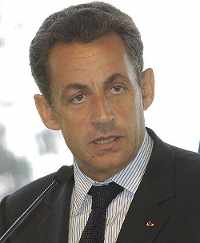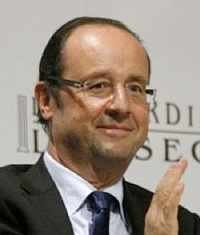
|
UNDERSTANDING
FRANCE
"Who's that?" – "Where's that?" "What's that ?" All those names and odd things that you've come across in France, but never understood what they were.... Check them out on the About-France.com A-Z Dictionary of France a guide to people, events, institutions and life in modern France About-France.com at random:
Contact: |

2012 elections
Archived page:
|
Click here for an overview of political parties in France
Click here for French Presidential Election 2017
| On this page | The electoral system | The front runners | The outsiders | The also-rans |
Second round results: François Hollande 51.64, Nicolas Sarkozy 48.36 .
The electoral system:
As for most elections in France, the Presidential poll is conducted in two stages.The first round is open to any candidate who meets the requirements (which include the written support of five hundred elected representatives of different sorts, including mayors and deputies) and has enough funding.
Assuming, as normally happens, that no single candidate acquires an absolute majority of votes on the first round, there is then a second round, which is a straight runoff between the two candidates who polled the most number of votes in the first round. The victor in this round then becomes President of France for the ensuing term of office, which is now five years.
The current president, Nicolas Sarkozy, was first elected in 2007 . A president can serve no more than two five-year terms in office.
Presidential election candidates in 2012
The list of candidates for the first round of the French presidential election is as follows (subject to validation by the Constitutional Council) ; Nicolas Sarkozy (Conservative), François Hollande (Socialist), Marine Le Pen (National Front), François Bayrou (Democratic movement), Jean-Luc M�lenchon (Left wing front), Eva Joly (Ecologists), Nicolas Dupont-Aignan (Sovereignist), Nathalie Arthaud (Far left) , Philippe Poutou (New Anticapitalist Party) and Jacques Cheminade (independent), These ten candidates will contest the first round of the 2012 presidential election; this is less than the 12 who took part in the first round of the 2007 French presidential election. The 2012 election is already being seen as a popular referendum on current president Nicolas Sarkozy, with a polarisation of votes on Sarkozy and on his main opponent, Socialist party candidate François Hollande. Polls have so far consistently predicted that Hollande will beat Sarkozy in the second round.
The front-runners:
 Nicolas
Sarkozy
officially declared as a candidate for a second term in office, on 15th
February. Former head of the
Conservative UMP party, he is the main candidate of the right. He is
campaigning as the champion of a "strong France" - la France forte -
and stressing his success in putting through unpopular but necessary
reforms, as well as his reasonably good standing as France's
representative on the international stage. He is strongly supported by
German chancellor Angela Merckel, and has been praised as a statesman
by Barack Obama. His campaign presents him as the only candidate able
to stand up for France on the international scene, and the candidate
who has the determination to put through the measures, however
unpopular they may be, necessary to stabilise the French economy and
return the country to a strong footing. He claims that his main
Socialist rival will either plunge France into economic disaster
through programmes that cannot be afforded, or else immediately renege
on his electoral promises.
Nicolas
Sarkozy
officially declared as a candidate for a second term in office, on 15th
February. Former head of the
Conservative UMP party, he is the main candidate of the right. He is
campaigning as the champion of a "strong France" - la France forte -
and stressing his success in putting through unpopular but necessary
reforms, as well as his reasonably good standing as France's
representative on the international stage. He is strongly supported by
German chancellor Angela Merckel, and has been praised as a statesman
by Barack Obama. His campaign presents him as the only candidate able
to stand up for France on the international scene, and the candidate
who has the determination to put through the measures, however
unpopular they may be, necessary to stabilise the French economy and
return the country to a strong footing. He claims that his main
Socialist rival will either plunge France into economic disaster
through programmes that cannot be afforded, or else immediately renege
on his electoral promises. François
Hollande
became the official Socialist candidate following a Socialist party
primary in autumn 2011, where he defeated his main rivals Martine Aubry
and S�gol�ne Royal.
Traditionally seen as a representative of the moderate wing of the
Socialist party, and criticised by party hard-liners as soft, he has
attempted in recent weeks to bolster his credentials as a man of the
left, promising if elected to create more public sector jobs - notably
more teachers - to reintroduce retirement at 60 for certain
employees, and to raise the top rate of income tax to 75%. At
the
same time he has committed himself to eliminating France's budget
deficit by 2017 and reducing tax breaks for companies and high earners.
In international terms, Hollande is not well known, having never held
any ministerial function: in terms of leadership, he has experience as
First Secretary of the Socialist Party, parlementarian, and mayor of
Tulle, a small town in central western France.
François
Hollande
became the official Socialist candidate following a Socialist party
primary in autumn 2011, where he defeated his main rivals Martine Aubry
and S�gol�ne Royal.
Traditionally seen as a representative of the moderate wing of the
Socialist party, and criticised by party hard-liners as soft, he has
attempted in recent weeks to bolster his credentials as a man of the
left, promising if elected to create more public sector jobs - notably
more teachers - to reintroduce retirement at 60 for certain
employees, and to raise the top rate of income tax to 75%. At
the
same time he has committed himself to eliminating France's budget
deficit by 2017 and reducing tax breaks for companies and high earners.
In international terms, Hollande is not well known, having never held
any ministerial function: in terms of leadership, he has experience as
First Secretary of the Socialist Party, parlementarian, and mayor of
Tulle, a small town in central western France.The outsiders
François Bayrou is a former minister and former member of the UDF conservative party, from which in 2007 he created a centrist party, the Mouvement D�mocratique or Modem. He stood for the presidency in 2002 and in 2007. Bayrou has the support of a considerable number of moderate conservatives - for whom Sarkozy is too right wing - and of middle-of-the-road social democrats, for whom Hollande is seen as too much of an old-style Socialist; but unless one of the leading candidates is severely damaged by a scandal or a collapse in credibility in the weeks before the first round of voting, Bayrou is unlikely to take more than 10% of the vote. On the other hand, he could be the joker in the pack and determine the outcome of the second round.Marine le Pen is leader of the right-wing FN (National Front) party. In 2002, her predecessor and father Jean Marie Le Pen created a bombshell by ousting Socialist candidate Lionel Jospin from the second round of the Presidential election. But Le Pen was then soundly trounced in the second round, where Jacques Chirac romped home with over 80% of the vote. Marine le Pen has tried to give her party a greater image of respectability than it has had in the past; but the party remains a bastion of populist nationalism and xenophobia, without any credible platform beyond slogans such as "French jobs for French workers". The FN's main impact on the presidential election is to oblige Sarkozy to court its millions of far-right voters, whose support he must gather if he is to avoid defeat in the second round.
Jean-Luc M�lenchon is a former Socialist minister, who served under Lionel Jospin. In 2008, he quit the Socialist party, claiming that it had lost its vocation as a party of the left, and set up his own new party, entitled simply and unambiguously the "Parti de Gauche" (the Party of the left). He is running in the 2012 Presidential election as the candidate of the Front de Gauche (the Left wing Front), a consortium of small left-wing parties including the French Communist Party. A firebrand orator, M�lenchon is standing as the anticapitalist and antiliberal candidate, and the true candidate of the left. His main impact on the election is to force François Hollande to adopt a seemingly more left-wing position, in order to avoid losing votes on the left.
Eva Joly is the candidate of Europe Ecologie, a federation of Green parties. The Greens have achieved a creditable number of votes in recent French presidential elections; but Eva Joly does not seem set to repeat this performance. Of Franco-Norwegian origin, the former Magistrate has lost support due to her straight talking and uncompromising positions, that have even led to dissentions within the ranks of the Green party.
The also-rans ... or didn't run
A number of declared candidates have already withdrawn from the race, or not obtained the necessary 500 endorsements from elected representatives, to allow them to stand. Most notably former minister of the environment Corinne Lepage, who withdrew in favour of Nicholas Sarkozy, Radical party chairman Jean-Louis Borloo - a former Sarkozy minister - and former prime minister Dominique de Villepin.The four who obtained the necessary number of endorsements – Dupont-Aignan, Arthaud, Poutou and Cheminade (independent), are unlikely to take much more than 1% of the vote each - if that
After the election
Within days of the result of the second round being declared, the new president will be sworn in, and take up (or continue) residence in the Elys�e Palace. In June, French voters will again go to the polls, this time to elect deputies (members of parliament) and - logically - to give the new president the majority he needs in Parliament ( l'Assemblée nationale) to enact his legislative programme.
© About-France.com 2012, Andrew Rossiter
Photos: Nicholas Sarkozy: Creative commons photo by Jean-Louis Aubert
François Hollande: Creative commons photo by MGTXX
